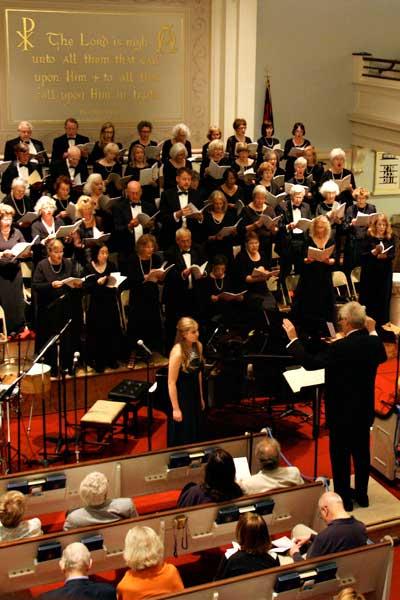Choir Wins Bernstein Challenge

Leonard Bernstein meets the Choral Society of the Hamptons!
Sounds unlikely? You would have changed your mind if you had been at one of the society’s two concerts at the Bridgehampton Presbyterian Church on Saturday.
Mark Mangini conducted the redoubtable choir in the difficult but exciting “Chichester Psalms,” two numbers from Bernstein’s Mass, which opened the Kennedy Center Opera House, and songs from the forgotten musical “Peter Pan” and the well-remembered “West Side Story” and “Candide.” Bible to Broadway indeed — and all under a church roof.
A weekend earlier, at Guild Hall in East Hampton, there was a showing of an impressive PBS documentary about Bernstein’s life subtitled “Reaching for the Note.” One of the film’s themes was his desire to be remembered for more than Broadway musicals. Much of Bernstein’s later work was devoted to this mission and had religious and/or philosophical themes.
“Chichester Psalms” — commissioned in 1965 by the dean of Chichester Cathedral in England for the Three Choirs Festival and performed here in a reduced orchestration by the composer — is a big challenge to any choir: The text is in Hebrew and the music is in Bernstein, with 7/4 and 5/4 meters, internal dissonances between the voices, and other delicious details. And you can’t just go through the motions; this music needs vigor and passion. This is the World Cup of contemporary choral singing, and our team emerged as winners!
Not an easy piece to sing or to listen to but ultimately extremely rewarding. The high point for me is in the second movement, when the sound of a child soprano — Olivia Knutsen, a 13-year-old with an angelic voice — is set against the men singing “Why Do the Nations Rage.” This is a classic Bernsteinian moment when the religious-philosophical elements and the composer’s theatricality come together in high tension. Ironically, both themes — the actual musical themes, that is — were recycled from Broadway musicals (a song that was cut from “West Side Story” and another from a musical that was never completed).
The rest of the program was a lot more easygoing. The two excerpts from the 1971 Mass included the jolly Sanctus for double choir (one choir was up in the balcony) and the chorale “Almighty Father.” Joanna Howard, the other soprano, offered a third section of Mass, “A Simple Song,” in the first performance, but it was omitted in the second.
After a sweet little song for the chorus rescued from “Peter Pan” came the hit tunes: “Tonight,” “Gee, Officer Krupke,” and “Somewhere” from “West Side Story,” followed by “The Best of All Possible Worlds” and “Make Our Garden Grow” from “Candide,” performed by Ms. Howard and Dominic Inferrara, baritone, with the choir. These numbers, familiar as they are, are little masterpieces of their kind and never seem to wear out their welcome, especially in such warm and witty performances. Mark Mangini was, as usual, a kind of genial host and master of ceremonies as well as the man in charge of the music-making.
Between the choral pieces and the show music, there was a rather odd “cabaret interlude,” featuring the two grown-up soloists and several choristers with a first-class instrumental ensemble. This sequence of jazz-inflected songs, jazz instrumentals, and a lively rhumba was performed by the gifted husband-and-wife team who organized the interlude, Jane Hastay, piano, and Peter Martin Weiss, bass, and the superb trumpet/flugel horn player, Alex Sipiagin.
Most of this segment took Bernstein’s show music into the cool jazz style of the ’50s and ‘60s. This is certainly an element in Bernstein’s music but in the tradition of Ives, Gershwin, and Copland, almost all of his work — Broadway scores, concert, and choral music — lands in another place. For that reason, the jazz/cabaret interlude, charming and beautifully performed as it was, had a very different vibe than the rest of the evening. The high points of the segment were “Tonight,” performed by the baritone and chorus, and “Ya Got Me” from “On the Town” in which Christine Cadarette, Maestro Mangini himself, and most of the audience joined in an irresistible rhumba.
Labor/Naxos is issuing Eric Salzman’s “Jukebox in the Tavern of Love,” a modern madrigal comedy (text by Valeria Vasilevski), commissioned and recorded by the Western Wind, along with Meredith Monk's “Basket Rondo.” Information and listening excerpts are available at ericsalzman.com.
